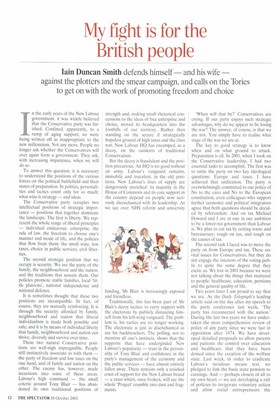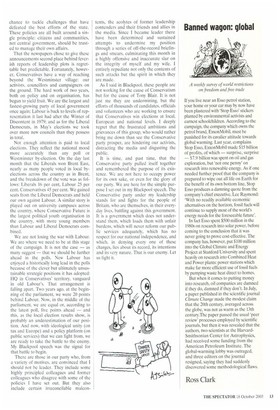My fight is for the British people
lain Duncan Smith defends himself — and his wife — against the plotters and the smear campaign, and calls on the Tories to get on with the work of promoting freedom and choice
–1n the early years of the New Labour government, it was widely believed that the Conservative party was finished. Confined, apparently, to a rump of aging support, we were being written off as inappropriate to the new millennium. Not any more. People no longer ask whether the Conservatives will ever again form a government. They ask, with increasing impatience, when we will do so.
To answer this question, it is necessary to understand the positions of the various forces on the political battlefield and their states of preparation. In politics, personalities and tactics count only for so much; what wins is strategy — and ideas.
The Conservative party occupies two intellectual positions of strategic importance — positions that together dominate the landscape. The first is liberty. We represent the whole range of liberal principles — individual endeavour, enterprise, the rule of law, the freedom to choose one's manner and mode of life, and the policies that flow from them: the small state, low taxes, choice in public services, civil liberties.
The second strategic position that we occupy is security. We are the party of the family, the neighbourhood and the nation, and the traditions that sustain them. Our policies promote stable families, local 'little platoons', national independence and national defence.
It is sometimes thought that these two positions are incompatible. In fact, of course, they are mutually reinforcing. It is through the security afforded by family, neighbourhood and nation that liberal individualism is made both possible and safe; and it is by means of individual liberty that family, neighbourhood and nation can thrive, diversify and survive over time.
These two natural Conservative positions are well-nigh impregnable. People still instinctively associate us with them — the party of freedom and low taxes on the one hand, and of family and nation on the other. The enemy has, however, made incursions into some of these areas. Labour's high command — the small coterie around Tony Blair — has abandoned its own traditional positions of strength and, making small rhetorical concessions to the ideas of free enterprise and choice, moved its headquarters into the foothills of our territory. Rather than standing on the secure if strategically hopeless ground of high taxes and the class war, New Labour HQ has encamped, as a decoy, on the outskirts of traditional Conservatism.
But the decoy is fraudulent and the position precarious. An HO is no good without an army. Labour's vanguard remains, immobile and truculent, in the old positions. New Labour's lines of supply are dangerously stretched: its majority in the House of Commons and its core support in the country depend on people now seriously disenchanted with its leadership. As we see over NHS reform and university funding, Mr Blair is increasingly exposed and friendless.
Traditionally, this has been part of Mr Blair's decoy tactics: to curry support with the electorate by publicly distancing himself from his left-wing vanguard. The problem is, his tactics are no longer working. The electorate is just as disenchanted as are his backbenchers. The polling, not to mention all one's instincts, shows that the supports that have undergirded New Labour's popularity — trust in the personality of Tony Blair and confidence in the party's management of the economy and the public services — have almost entirely fallen away. There remains only a residual crust of support for the New Labour brand — a crust which, once broken, will see the whole 'Project' crumble into dust and fragments. 'When will that be?' Conservatives are crying. If our party enjoys such strategic advantages, why do we appear to be losing the war? The answer, of course, is that we are not. You simply have to realise what stage of the war we are at.
The key to good strategy is to know when and on what ground to attack. Preparation is all. In 2001, when I took on the Conservative leadership, I had two essential tasks to accomplish. The first was to unite the party on two key ideological questions: Europe and taxes. I have achieved that unification. The party is overwhelmingly committed to our policy of No to the euro and No to the European constitution; even colleagues who support further economic and political integration agree that both questions should be decided by referendum. And on tax Michael Howard and I are at one in our ambition to be a lower-tax government than Labour is. We plan to cut tax by cutting waste and bureaucracy: tough on tax, and tough on the causes of tax.
The second task I faced was to move the party on from Europe and tax. These are vital issues for Conservatives, but they do not engage the interests of the voting public to quite the same degree that they excite us. We lost in 2001 because we were not talking about the things that mattered to people: healthcare, education, pensions and the general quality of life.
Two years later I am proud to say that we are. As the Daily Telegraph's leading article said on the day after my speech to the party conference last week, 'The party has reconnected with the nation.' During the last two years we have undertaken the most comprehensive review of policy of any party since we were last in opposition after 1974. We have developed detailed proposals to allow parents and patients the control over education and healthcare that they have been denied since the creation of the welfare state. Last week, in order to eradicate Labour's invidious means test, we pledged to link the basic state pension to earnings. And — perhaps closest of all to my own heart — we are developing a raft of policies to invigorate voluntary action and allow social entrepreneurs the chance to tackle challenges that have defeated the best efforts of the state.
These policies are all built around a single principle: citizens and communities, not central government, should be trusted to manage their own affairs.
That the newspapers chose to give these announcements second place behind feverish reports of leadership plots is regrettable but predictable. Fortunately, however, Conservatives have a way of reaching beyond the Westminster village: our activists, councillors and campaigners on the ground. The hard work of two years, both on policy and on organisation, has begun to yield fruit. We are the largest and fastest-growing party of local government once again: Labour is back to levels of representation it last had after the Winter of Discontent in 1979; and as for the Liberal Democrats, in May's elections we took over more new councils than they possess in total.
Not enough attention is paid to local elections. They reflect the national mood more accurately than any poll or Westminster by-election. On the day last month that the Liberals won Brent East, nearly as many people voted in local byelections across the country as in Brent, and the breakdown of the vote was as follows: Liberals 16 per cent, Labour 25 per cent. Conservatives 45 per cent. We gained seats from the Liberal Democrats and held our own against Labour. A similar story is played out on university campuses across the country, where Conservative Future is the largest political youth organisation in the country, with more young members than Labour and Liberal Democrats combined.
We are not losing the war with Labour. We are where we need to be at this stage of the campaign. It is not the case — as many suggest — that we should be further ahead in the polls. New Labour has enjoyed a historically long lead in the polls because of the clever but ultimately unsustainable strategic positions it has adopted: HQ in Conservatives' territory, vanguard in old Labour's. That arrangement is falling apart. Two years ago, at the beginning of the parliament, we were 20 points behind Labour. Now, in the middle of the parliament, we are equal or, according to the latest poll, five points ahead — and this, as the local election results show, is probably an underestimation of our position. And now, with ideological unity (on tax and Europe) and a policy platform (on public services) that we can fight from, we are ready to take the battle to the enemy. My Blackpool speech was the signal for that battle to begin.
There are those in our party who, from a variety of motives, are convinced that I should not be leader. They include some highly principled colleagues and former colleagues who disagree with some of the policies I have set out. But they also include certain irreconcilable malcon
tents, the acolytes of former leadership contenders and their friends and allies in the media. Since I became leader there have been determined and sustained attempts to undermine my position through a series of off-the-record briefings and smears, culminating this month in a highly offensive and inaccurate slur on the integrity of myself and my wife. 1 entirely repudiate not only the contents of such attacks but the spirit in which they are made.
As I said in Blackpool, these people are not working for the cause of Conservatism but for the cause of Tony Blair. It is not just me they are undermining, but the efforts of thousands of candidates, officials and volunteers who are working to ensure that Conservatives win elections at local, European and national levels. I deeply regret that the frustrated ambitions and grievances of this group, who would rather bring me down than see the Conservative party prosper, are hindering our activists, distracting the media and disgusting the public.
It is time, and past time, that the Conservative party pulled itself together and remembered the purpose of its existence. We are not here to occupy power for its own sake, or even for the glory of our party. We are here for the simple purpose I set out in my Blackpool speech. The Conservative party under my leadership stands for and fights for the people of Britain, who are themselves, in their everyday lives, battling against this government. It is a government which does not understand them, which loads them with unfair burdens, which will never reform our public services adequately, which has no respect for our national independence, and which, in denying every one of these charges, lies about its record, its intentions and its very nature. That is our enemy. Let us fight it.



































































































 Previous page
Previous page